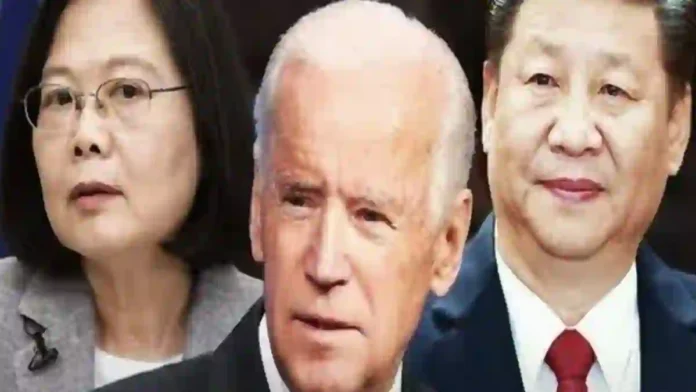Washington: The US is “deeply concerned” over the Chinese army’s joint military drills in the Taiwan Strait and around Taiwan. US Department of State official spokesperson Matthew Miller urged China to act with restraint.
US State Department’s statement comes after China launched two-day-long military drills on Thursday and Friday (May 23-24) involving land, sea, air, and rocket forces, Taiwan News reported. China launched the exercise days after Lai Ching-te was sworn in as Taiwan’s President on May 20.
In a statement, Matthew Miller stated, “The United States is deeply concerned over the People’s Liberation Army joint military drills in the Taiwan Strait and around Taiwan. We are monitoring PRC activities closely and coordinating with allies and partners regarding our shared concerns.”
Miller noted that use of normal, routine and democratic transition as an excuse for military provocations risks escalations and erodes longstanding norms that for years have maintained peace and stability across the Taiwan Strait.
US Department of State spokesperson stated, “The United States is deeply concerned over the People’s Liberation Army joint military drills in the Taiwan Strait and around Taiwan. We are monitoring PRC activities closely and coordinating with allies and partners regarding our shared concerns.”
“We strongly urge Beijing to act with restraint. Using a normal, routine, and democratic transition as an excuse for military provocations risks escalation and erodes longstanding norms that for decades have maintained peace and stability across the Taiwan Strait, which is critical for regional and global security and prosperity and a matter of international concern,” he added.
Matthew Miller stated that US remains committed to its longstanding one China policy, guided by the Taiwan Relations Act, the Three Joint Communiques, and the Six Assurances.
The drills, spanning the Taiwan Strait and areas adjacent to Taiwan-controlled islands near China’s coast, commenced just days after Lai’s assumed office.
Days after Lai Ching-te was sworn in as Taiwan’s President, China launched two-day-long military drills on Thursday, surrounding the nation in what it called “punishment” for so-called “separatist acts,” CMNN report.
According to China’s state broadcaster CCTV, as part of the drills, dozens of Chinese fighter jets carrying live ammunition carried out mock strikes against “high-value military targets” of the “enemy” alongside destroyers, frigates and missile speedboats.
Read- THE IMPORTANCE OF MAKING THE CARL-GUSTAF ROCKET LAUNCHER IN INDIA
Despite never having controlled Taiwan, China’s ruling Communist Party claims it as part of its territory and has vowed to take the island by force if necessary. China said it began joint military drills involving the army, navy, air force, and rocket force in areas around Taiwan at 7.45 am (local time) on Thursday.
The drills are taking place in the Taiwan Strait, a narrow body of water that separates the island from mainland China, as well as north, south, and east of Taiwan, reported CNN. They are also taking place near Taiwan’s outlying islands of Kinmen, Matsu, Wuqiu, and Dongyin, which are just off China’s southeastern coast, according to a statement from the PLA’s Eastern Theatre Command.
PLA Naval Colonel Li Xi, the command’s spokesperson, described the exercises as “a strong punishment for the separatist acts of Taiwan independence forces and a serious warning against interference and provocation by external forces, as per CNN.
Taiwan, in retaliation, has also deployed its own warships to monitor the situation. This comes as Beijing regards Taiwan’s Lai as a “dangerous separatist” as he backs island’s sovereignty and distinct identity, reported CNN. He succeeded two-term President Tsai Ing-wen, marking the Democratic Progressive Party’s unprecedented third consecutive term in power.
Beijing criticised Lai’s inauguration speech, in which he urged China to end its intimidation of Taiwan. In his inaugural speech after being sworn in as Taiwan’s President, Lai Ching-te, called on Beijing to stop intimidating the island nation, over which China continues to make its claim.
In his inauguration address, Lai called on Beijing “to cease their political and military intimidation against Taiwan, share with Taiwan the global responsibility of maintaining peace and stability in the Taiwan Strait as well as the greater region, and ensure the world is free from the fear of war.”
Lai, a former doctor and vice president, was inaugurated alongside newly appointed Vice President Hsiao Bi-khim, who most recently held the position of Taiwan’s principal ambassador to the United States.
Beijing publicly slammed both the leaders and their party for defending Taiwan’s sovereignty. Despite never having ruled the island, China’s ruling Communist Party claims it is part of its territory and has threatened to annex the island, using force if necessary.
(With Agency Inputs)




